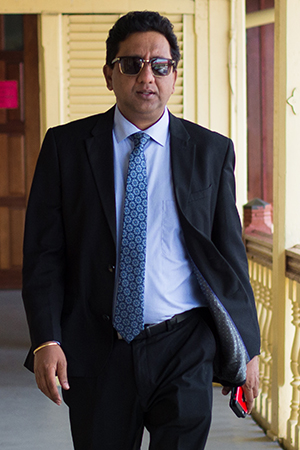…lawyers argue dual citizenship well placed before the courts
THE application filed by Compton Reid challenging the validity of the vote cast by Charrandass Persaud in the National Assembly on December 21, 2018, could not have been brought by way of an election petition because it was only recently discovered that Persaud holds dual citizenship, Senior Counsel Neil Boston argued on Thursday.

He was at the time defending the application by Reid, a farmer from Berbice, who has asked the High Court to issue seven declarations and two orders, setting aside the order of the Speaker that the No-Confidence Motion, Resolution No. 101 was passed, and staying the enforcement of Resolution No. 101 declared by the Clerk of the National Assembly. But Persaud’s Attorney, Sanjeev Datadin, and Anil Nandlall, the attorney representing the Leader of the Opposition, are arguing that the High Court does not have jurisdiction to hear the case.
On Thursday when the case was heard by Chief Justice (ag) Roxane George-Wiltshire, Boston, who appeared in association with Attorneys-at-Law Rex McKay S.C, Stanley Moore and Robert Corbin, argued that Reid’s application was well placed. He alluded to Article 163 (1) of the Constitution of Guyana, which states “Subject to the provisions of this article, the High Court shall have exclusive jurisdiction to determine any question – (a) regarding the qualification of any person to be elected as a member of the National Assembly.”
Boston submitted to the court that the question of qualification is what was put to the Court. Reid, through his attorneys, is arguing that Persaud was not qualified to be a Member of Parliament because he holds dual citizenship which is a contravention to Article 155 (1). While that article bars Members of Parliament from having dual citizenship, Persaud sat in the National Assembly for more than three years while being a citizen of both Guyana and Canada.
Provisions
Submitting that the court has jurisdiction to hear the case, the Senior Counsel drew to the attention of the Chief Justice Article 163 (4) of the Constitution which states that “Parliament may make provision with respect (a) the circumstances and manner in which and the conditions upon which proceedings for the determination of any question under this article may be instituted in the High Court and appeal may be brought to the Court of Appeal in respect thereof.”
He noted that while the National Assembly (Validity of Elections) Act and the National Assembly (Validity) of Elections Rules provide for an election petition to be brought before the High Court within 28 days after the results of the elections were declared, Parliament did not stipulate how the Court should be approached after the expiration of the 28 days when a fault was discovered.
Boston told the court that it was after Persaud voted in favour of the Opposition-sponsored No-Confidence Motion, that it was discovered that he held dual citizenship. “Some three years and eight months after elections was certified, it was discovered that Charrandass was not electable…three years,” he told the Court.
The Senior Counsel said while Persaud’s attorney would wish to confine the applicant to a period of 28 days, to adopt such an argument would be flawed.
“To adopt the argument of those parties who oppose the Fixed Date Application is inviting this Court to attribute to the legislature an intention to produce a capricious or unjust results,” he submitted, while adding “could it be the intention of Parliament that an election petition is the only mode of challenging a particular conduct, the only mode of coming to complain of an act which occurred three years after.”
He maintained that Parliament did not make provision for the situation currently facing the court.
Struck out
But Datadin told the court that the proceedings should be struck out. “The questioning of an election, and the election of a Member of Parliament is a specific and special jurisdiction afforded to the court,” Datadin said while arguing that pursuant of Article 165, Parliament regulates its own conduct and procedures. He said it is the Speaker who adjudicates on matters within the Parliament and not the Court.
Citing the Case of the Attorney General of Guyana v Raphael Trotman and others, Datadin, in quoting Justice Ian Chang, said the court has no power to enquire into what occurs within the walls of the National Assembly except on the grounds of unconstitutional matters.
He maintained that there is no provision for the declarations being sought by Reid to be made as it relates to what is “perceived to be a constitutional breach.”
He also argued that there was no live issue before the court on the basis that Persaud was removed from the National Assembly. Datadin’s arguments were supported by Anil Nandlall, representing Opposition Leader Bharrat Jagdeo who emphasised that the time to challenge an election of a Member of Parliament to the National Assembly has elapsed.
In rebutting the arguments put by Datadin and Nandlall, Attorney General Basil Williams told the Court there was no need for the applicant to file an election petition because it is not an election case. He put to the Court that Article 163 contemplated the creation of an election court in election season to treat with matters relative to a just concluded election, hence the 28 days provision. He said the court, in treating with such constitutional matter, cannot fail to act when the election season has ended.



.jpg)









